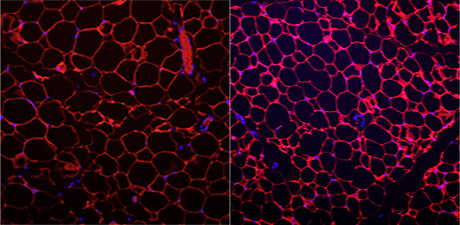Scientists at the University of British Columbia have discovered a gene that could be an important cause of obesity.
The gene, which encodes a protein called 14-3-3zeta, is found in every cell. But when the gene was silenced in mice, they had half of a specific kind of unhealthy “white fat” – the kind associated with obesity, heart disease and diabetes – compared to normal mice, despite consuming the same amount of food. Mice that were bred to have higher levels of 14-3-3zeta were noticeably bigger and rounder, having an average of 22 per cent more white fat when fed a high calorie diet.
Earlier this year, a consortium of scientists found over 100 regions on the human genome that correlate with obesity, likely through regulating the brain’s perception of hunger and the distribution of fat throughout the body. That study, however, did not identify the gene that encodes 14-3-3zeta, which in contrast controls the production of fat cells (known as adipogenesis) and the growth of those cells.
Discovery of this direct link between a protein and fat production, described today in Nature Communications, points the way to a possible drug therapy that, by suppressing the gene or blocking the protein, could prevent fat accumulation in people who are unhealthily overweight, or are on their way to becoming so.
“People gain fat in two ways – through the multiplication of their fat cells, and through the expansion of individual fat cells,” said Gareth Lim, a postdoctoral fellow in UBC’s Life Sciences Institute. “This protein affects both the number of cells and how big they are, by playing a role in the growth cycle of these cells.”
Dr. Lim and James Johnson, a professor of Cellular and Physiological Sciences, began investigating the 14-3-3 family of proteins four years ago because it shows up prominently in the unhealthy fat tissue of obese people. This study not only identified zeta as the operative protein, but demonstrated a clear cause-and-effect between 14-3-3zeta and fat accumulation.
“Until now, we didn’t know how this gene affected obesity,” Dr. Johnson said. “This study shows how fundamental research can address major health problems and open up new avenues for drug discovery.”
Obesity is linked to increased risk of diabetes, heart disease, and some forms of cancer. Worldwide, obesity costs society $2 trillion each year. More than one in four Canadians are obese, and that number continues to grow, according to Statistics Canada. Alarmingly, the obesity rate is also increasing in children.

